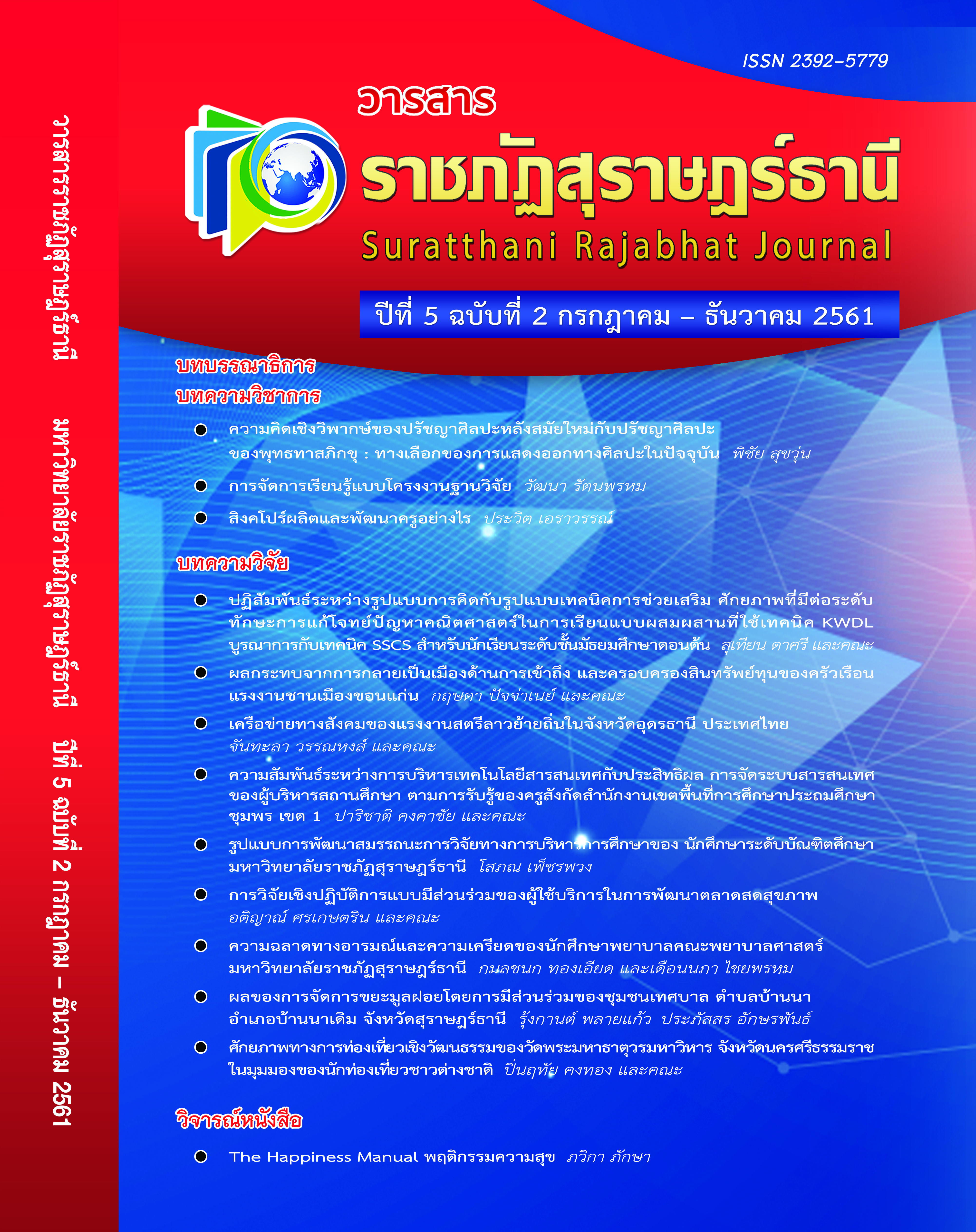Emotional Intelligence and Stress of Nursing Students at Faculty of Nursing, Suratthani Rajabhat University
Main Article Content
Abstract
This objective of this research were to study the level of emotional intelligence, stress and the relationship between emotional intelligence and stress. The samples were 70 students at the Faculty of Nursing, Suratthani Rajabhat University. The instrument used in this study was a questionnaire including personal information, Emotional Intelligence questionnaire and the Suanprung Stress SPST-20. The statistics used in the study were frequency, percentage, mean, S.D., and the Pearson’s product-moment correlation coefficient
The research results were as follows: 1) The emotional intelligence level of nursing students at the Faculty of Nursing, Suratthani Rajabhat University mostly was at a normal level. The Stress level was at a normal level; 2) According to the analysis of the relationship between Emotional Intelligence and Stress, the score of Emotional Quotient was inversely related to scores of stress (r= -0.143*) with statistically significance (p<.05). Responsibility, problem-solving decision and the pride of nursing students were related at a normal level.
Article Details
References
กนกพร หมู่พยัคฆ์. (2556). ความสัมพันธ์ระหว่างความฉลาดทางอารมณ์กับพฤติกรรม การปรับตัวของนักศึกษาพยาบาล. วารสารพยาบาลศาสตร์, 33(1), 55-65
ทวีทรัพย์ ผาโต้ ณัฐวุฒิ แดงประเสริฐ และเกษวดี ชมเชยผล. (2558) การศึกษาความ เครียดและการจัดการความเครียดของนักศึกษา มหาวิทยาลัยราชภัฏสกลนคร ชั้นปีที่ 1 ภาคปกติ [ออนไลน์]. เข้าถึงได้จาก : www.it.mju.ac.th/[2558, เมษายน 20].
นิศารัตน์ นรสิงห์. (2551). ความเครียดและความฉลาดทางอารมณ์ของนักศึกษา พยาบาลศาสตรบัณฑิต ชั้นปีที่ 1 วิทยาลัยพยาบาลบรมราชชนนีนครศรีธรรมราช. โครงการผลิตพยาบาลวิชาชีพเพิ่มเพื่อแก้ไขปัญหา ชายแดนภาคใต้ 2551.
บุญธรรม กิจปรีดาบริสุทธิ์. (2543). การวัดและการประเมินผลการเรียนการสอน. กรุงเทพฯ : ภาควิชาศึกษาศาสตร์ คณะสังคมศาสตร์และมนุษยศาสตร์
มหาวิทยาลัยมหิดล.
มาลีวัล เลิศสาครศิริ. (2557). ความสัมพันธ์ระหว่างปัจจัยส่วนบุคคล และปัจจัยสิ่งแวดล้อมกับความเครียดและการจัดการความเครียดขณะฝึกปฏิบัติงานห้องคลอดของนักศึกษาพยาบาลวิทยาลัยเซนต์หลุยส์. 15(2), 270 - 279.
ระวิวรรณ แสงฉาย. (2557). ปัจจัยที่มีผลต่อความเครียดของนักศึกษา
คณะสาธารณสุขศาสตร์ มหาวิทยาลัยกรุงเทพธนบุรี. คณะสาธารณสุขศาสตร์ มหาวิทยาลัยกรุงเทพธนบุรี.
ศุภาพิชญ์ โฟน โบร์แมนน์. (2553). ความฉลาดทางอารมณ์และความพร้อมในการปฏิบัติงาน ในบทบาทพยาบาลวิชาชีพของนักศึกษาพยาบาล. วารสารวิจัยทางวิทยาศาสตร์ สุขภาพ. นนทบุรี.
สมจินดา ชมพูนุท. (2554). พลังสุขภาพจิต ความฉลาดทางอารมณ์ และความเครียด ของนักศึกษาพยาบาล วิทยาลัยพยาบาลสภากาชาดไทย. วารสารการพยาบาล จิตเวชและสุขภาพจิต, 26(1). 87 - 98
สุพัตรา พุ่มพวง. (2552). ความฉลาดทางอารมณ์ ความเครียดของนักศึกษาพยาบาล และบุคลากร วิทยาลัยพยาบาลบรมราชชนนี สุพรรณบุรี. สุพรรณบุรี :
วิทยาลัยพยาบาลบรมราชชนนี สุพรรณบุรี.
สุมาลี จูมทอง, ดุษฎี โยเหลา, งามตา วนินทานนท์ และ สธญ ภู่คง. (2552). ประสบการณ์ความเครียดและวิธีการเผชิญความเครียดของนักศึกษาพยาบาล จากการเรียนภาคปฏิบัติในห้องคลอด.วารสารพฤติกรรมศาสตร์, 15(1), 39 - 56.
Brewer J. & Cadman C. (2000). Emotional intelligence: enhancing student effectiveness and patient outcomes. Nurse Educator. 25(6): 264-266.
Jordan P. J. & Troth A. C. (2002). Emotional intelligence and conflict resolution in nursing. Contemporary Nurse. 13(1): 94 - 100
Krejcie, R. V. & Morgan, D. W. (1970). Determining Sample Size for Research Activities. Educational and Psychological Measurement, 30(3), 607 - 610.
Salovey & Mayer. (1990). Emotional intelligence. Imagination, Cognition, and Personality, 9, 185 - 211.


